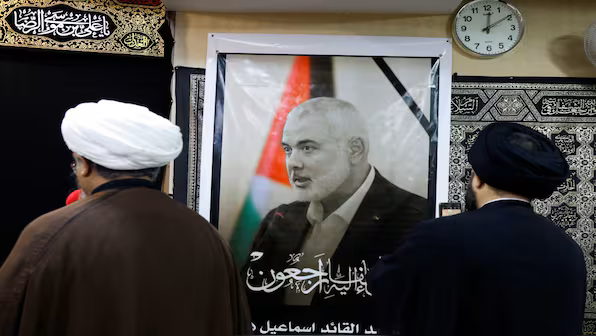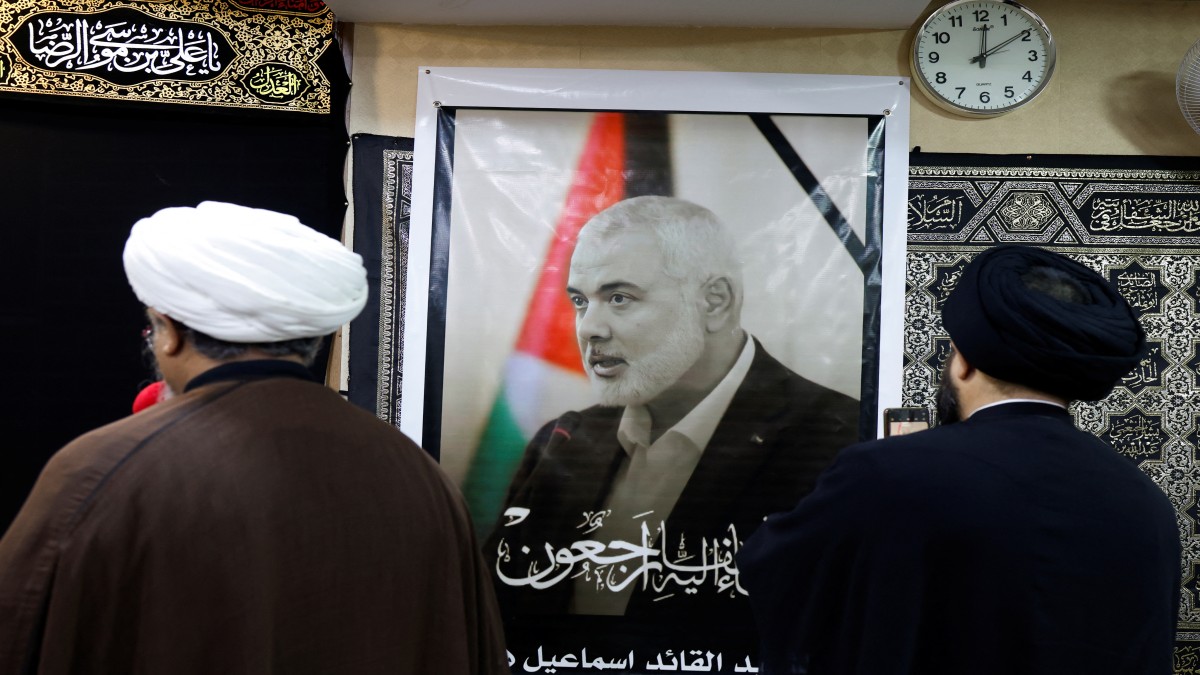Iran and Israel: Conundrum of targeted killings and Netanyahu’s quest to escape humiliation
- September 19, 2024
- Posted by: Anil Trigunayat
- Categories: Iran, Israel

The age of quick wars is over; in an asymmetric war between the state and non-state actors, definitive outcome and speed of victory are hardly assured
)
)
The assassination of Hamas chief Ismail Haniyeh has sparked fears of an all-out war in West Asia. In the photo, clerics offer condolences to Haniyeh. (Photo: Reuters)
The killing of Hamas Polit Bureau Head Ismail Haniyeh in Tehran (July 31), apparently by a covert IED hidden two months ago and remotely detonated, does not portend well for peace in the region and Gaza. It also very clearly exposed the holes, moles, and vulnerabilities in the Iranian security outfits and became a blot for the Iranian Revolutionary Guards Corps (IRGC), which was in charge of the Guest House, where Haniyeh was staying. He was one of the major interlocutors even as the militant wing chief Yahya Sinwar did not agree with Haniyeh’s pragmatism approach and yielding to Israeli demands in the course of ceasefire negotiations during the past nine months.
Advertisement
Haniyeh was on top of the elimination list of Mossad and other agencies as Benjamin Netanyahu vowed to destroy Hamas in the wake of the October 7 terror attacks, which had an unprecedented success for Hamas—when not only nearly 1,200 Israelis were killed but 250 of them taken hostage. These became the key going forward, as their release remains a priority due to months-long domestic protests by distraught families and friends.
The Israeli response, as expected, has been severe, with carpet bombing across the narrow strip of Gaza killing nearly 40,000, with 100,000 injured Gazans living under inhumane conditions, let alone repeated displacements of millions. This disproportionate response and defiance of global appeals, international law, and UN Security Council Resolutions eroded the sympathy for Israeli leadership, who are facing the genocide charges and warrant of arrest by the International Court of Justice (ICJ) and International Criminal Court (ICC), respectively, let alone increasing recognition of the State of Palestine by several European and Latin American countries.
You May Like
Young Millionaire From New Delhi Tells How She Got RichSetfieseepRead More
The Israeli objective of destroying Hamas has met with limited success despite them following the Hanibal doctrine (i.e. the kidnapping must be stopped by all means, even at the price of striking and harming our own forces). But they have taken out several key leaders and persons in strikes, countering the accusation that Israeli Defence Forces and Mossad were no longer invincible—a message conveyed by Hamas on October 7.
The fact that Hamas is very much there negotiating a deal, with over 120 hostages still in their captivity and war nowhere near the end, between a state and non-state actors proves its survivability and a fear that the strategy pursued should not lead to strategic defeat and further diplomatic isolation gaps at the Israeli establishment. For now, Israel is not in a relenting mood.
Advertisement
Ever since October 7, the international community has been besieged with the fear that the Israel-Hamas War should not escalate beyond its immediate periphery. Half-baked efforts have been made to rein in the warring parties. Consequently, Hamas could muster moral and material support from Hezbollah (Lebanon, Syria) and Houthis (Yemen and the Red Sea), Kataib Hezbollah, and other Shia militias (Iraq against US bases) even as others kept the escalation under the threshold, presumably with the connivance of their benefactor in Iran.
On the other hand, Netanyahu continued to exploit the strategic weakness of his ironclad support from Washington DC. His last week’s oration and address to the US Congress and repeated standing ovations could only confirm that Palestinians were expendable. The financial assistance, weapons, and political support were once again assured to Bibi by Biden, Harris, and Trump, even as they urged him to close the ceasefire deal quickly. Some say, hoping for Trump’s victory, Netanyahu is free to do as he pleases until November .
Advertisement
Although denied by Hezbollah, the Majdal Shams football field attack killed 12 young Druze boys and over 40 injured in occupied Golan Heights, which evoked immediate Israeli missile strikes in southern Lebanon, killing a senior Hezbollah commander, Fouad Shukr. So, Hezbollah has a reason to escalate and gets a pretext with the killing of Hamas Leader Haniyeh in Tehran in concert with Hamas and Palestinian causes. Hezbollah is no cakewalk for Israel.
Houthis are also waiting to expand their political legitimacy even as the Yemen officially recognised leadership has urged them not to drag the country into an undesirable war. Although Houthi attacks on merchant shipping have forced the insolvency of the Eilat Red Sea port of Israel, the counterattack on Hodeida port by Israeli bombers was a hard response and reminder to them to desist from adventurism. But Houthis are not the ones to be deterred after tasting success in their 8-year-old war against Sunni forces led by Saudi Arabia.
Advertisement
This shows that in the asymmetric wars between the state and non-state actors, a definitive outcome and speed of victory are hardly assured. The age of quick wars is over. That’s what Biden tried to tell Netanyahu, referring to the Afghan and Iraq fiasco on October 9 and 23, when he dashed down to sympathise with Israelis in the wake of terror attacks. They have been trying for some ceasefire ever since while maintaining support for Israel’s right to defend itself.
Netanyahu addressed the nation after the killing, even though they have not acknowledged or accepted the allegation of assassination of Haniyeh, but he spoke clearly of the success in killing targets like Mohammed Deif and Faud Shukr, reiterating, ‘Since the beginning of the war, I have made it clear that we are in a fight against Iran’s axis of evil. This is an existential war against a stranglehold of terrorist armies and missiles that Iran would like to tighten around our neck.’
Advertisement
Netanyahu’s saving grace with Israelis is the successes in decapitating and decapacitating the Hamas and Hezbollah leadership and their operational networks. Reassuring the citizens and seeking more time, he lambasted that Israel had delivered crushing blows to Iran’s proxies of late, including Hamas and Hezbollah, and would respond forcefully to any attack.
Many observers point out that whenever Israeli leadership is under pressure, especially from Washington, it makes bold and escalatory moves to drag them right back in line. An attack on the Iranian Consulate in Damascus killing some IRGC commanders was one such instance. Escalation was avoided as both Iran and Israel responded in kind and below the threshold; thus, face-saving was secured by both sides.
Iran and Israel suffer from Mutually Assured Destruction Syndrome (MAD) and consider one another as an existential threat, knowing too well that the open war between them would be disastrous for the region and the world, and the international community will do whatever it takes to stop that. Hence, although worried, US White House spokesman John Kirby averred that Washington did not see an all-out conflict in the region as imminent or inevitable and that it was working to prevent that from happening. Qataris and Egyptians, Turks, Russians, and the Chinese are all conferring as to how to contain the crisis.
But this time the killing of Haniyeh in Tehran is a typical redline that will force Iranians to respond visibly in kind. Not that for Haniyeh, Iran will take the risk of expanding the war directly, but it has other big cards (proxies such as Hamas, Hezbollah, Houthis) in the pack that can carry out the task with plausible deniability.
But a direct action could only reduce the intensity of humiliation since it happened within a few hours of the new Iranian President Masoud Pezeshkian’s swearing-in ceremony in the presence of many leaders from the region and beyond. Khamanei and Pezeshkian have both vowed an avenging response and punishment, but what costs they are willing to absorb will decide the quantum, time, and manner of the Iranian response. Hopefully the chain reaction will be avoided and pragmatism will prevail. Israel killing several top leaders of Hamas and Hezbollah has redeemed Netanyahu’s credibility with his people, to some extent.
The author is the former Indian Ambassador to Jordan, Libya and Malta and is currently a Distinguished Fellow with Vivekananda International Foundation. Views expressed in the above piece are personal and solely those of the author. They do not necessarily reflect Firstpost’s views.
